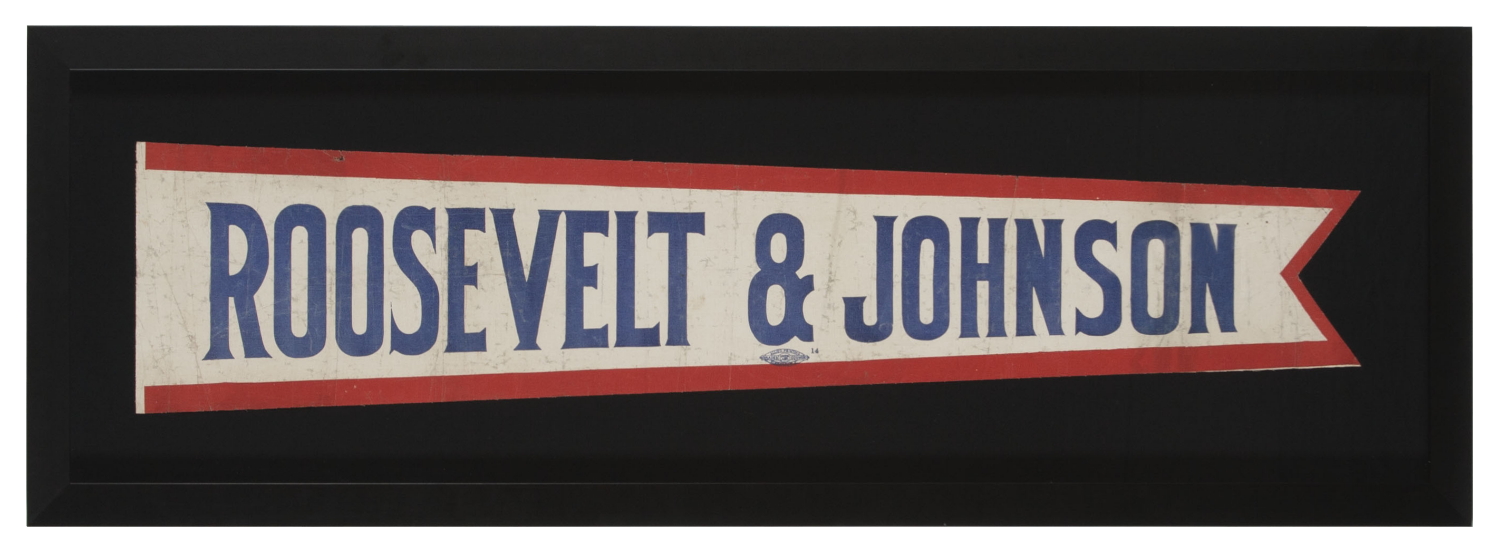
| |
ELONGATED PENNANT MADE FOR THE 1912 PRESIDENTIAL CAMPAIGN OF THEODORE ROOSEVELT & HIRAM JOHNSON, WHEN THEY RAN ON THE INDEPENDENT, BULL MOOSE / PROGRESSIVE PARTY TICKET |
|
| Available: |
Sold |
| Frame Size (H x L): |
18.25" x 54.5" |
| Flag Size (H x L): |
9.25" x 46" |
|
| Description....: |
|
Elongated, tapered, parade flag pennant, in a swallowtail format, similar to a ship's burgee. Made for the 1912 presidential campaign of Theodore Roosevelt and Hiram Johnson, the textile is printed in heavy pigment on coarse cotton, with a resulting finish that is not unlike oilcloth. The surnames of the candidates appear in large blue text, separated by an ampersand, on a white ground, surrounded by a red border. The union bee of the Albany Allied Printing Trades Council appears in the bottom center. This was an organization of local unions involved in all aspects of the printing trade. Examples of this pennant are rare. More than one size was produced and it can easily be argued that this is the most desirable due to its large yet manageable scale. The bold design and colors have lots of visual strength and the condition is excellent for the period.
Theodore Roosevelt and the 1912 Campaign:
After serving as president from 1901-1904 following the death of William McKinley, and his subsequent election to the office with running mate Charles Warren Fairbanks in 1904, Roosevelt declined to run again in 1908. His decision reflected a long-standing tradition that presidents were expected to leave office after two terms. Teddy appointed his friend, William Howard Taft, as his successor, and Taft went on to win the election of 1908. During his forthcoming administration, however, a rift grew between Taft and Roosevelt, who each became leaders of the Republican Party's two ever-spreading wings. The progressives, under Roosevelt, opposed the court system, favored restrictions on women's employment, favored conservation, were more favorable toward labor unions, and opposed tariffs. The conservatives, under Taft, were pro-business and insisted on judicial supremacy. By 1910 the split was deep. Roosevelt ran for nomination on the Republican ticket but lost to Taft, so in true T.R. fashion, he waved off defeat and set out on his own.
Officially titled the Progressive Party, Roosevelt adopted the Bull Moose as its mascot and the party adopted the animal as its nickname. Despite rather serious opposition from his many Republican friends, he jumped into the ring with no apparent reason to believe that he might actually lose. In the election, he did beat Taft, gaining 88 electoral votes versus Taft’s almost non-existent count of 8, and by doing so became the only man in history to place second on an independent ticket. He was slaughtered by Wilson, however, who received 435 votes in the Electoral College and went on to serve two terms.
Afterwards a disgruntled Roosevelt, eager to put the election behind him, retreated to what he loved best, risk and adventure. In 1914 he traveled to the Amazon jungle, where he ran down an uncharted river and nearly perished. He passed in his sleep of a coronary embolism not long afterward in 1919, during Wilson’s second term. To this Wilson's vice president at the time, Thomas R. Marshall, remarked: "Death had to take Roosevelt sleeping, for if he had been awake, there would have been a fight." The former president was buried at Youngs Memorial Cemetery near Sagamore Hill, his Oyster Bay, NY estate.
Hiram Johnson was a California-born attorney who gained fame as a prosecutor in public corruption cases and was eventually elected Governor of the state. This occurred in 1911, just one year before being nominated as the Progressive Party's vice presidential candidate. He remained governor throughout the campaign and until 1917, the year that the U.S. entered WWI. He ran for the United States Senate that same year, was elected, and served until his death in 1945, the year that also saw the close of WWII.
Mounting: The flag was mounted and framed within our own conservation department, which is led by expert staff. We take great care in the mounting and preservation of flags and have framed thousands of examples.
The background is 100% cotton twill, black in color. The modern, black-painted molding has a rectangular profile. The glazing is U.V. protective plexiglass.
Condition: There is minor pigment loss, a minor tear along the top edge, near the hoist, and a few tiny stains, but the overall condition is excellent for the period. |
|
|
|
| Collector Level: |
Advanced Collectors and the Person with Everything |
|
| Flag Type: |
Parade flag |
|
| Star Count: |
|
|
| Earliest Date of Origin: |
1912 |
|
| Latest Date of Origin: |
1912 |
|
| State/Affiliation: |
New York |
|
| War Association: |
|
|
| Price: |
SOLD |
|
| |
Views: 586 |
|
|
|

